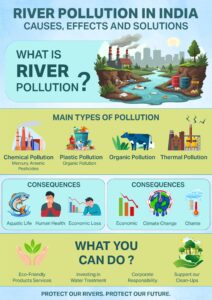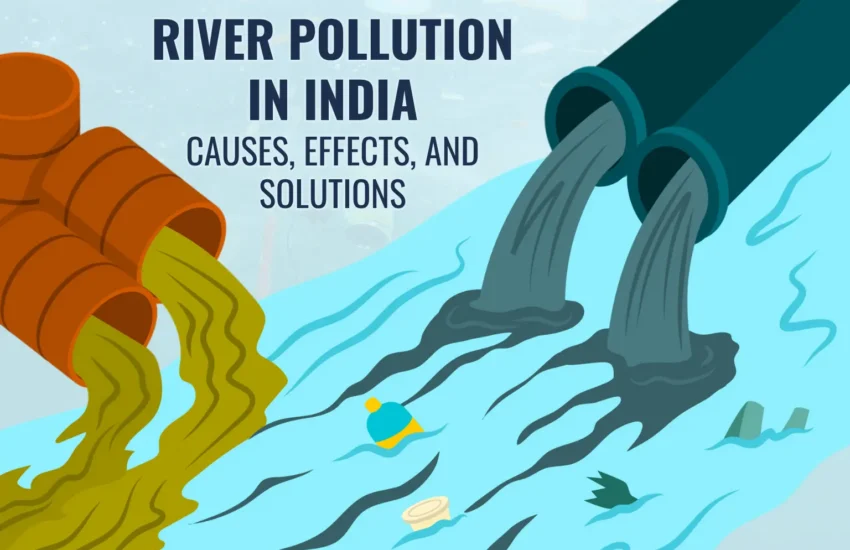River pollution is the entry of harmful substances into rivers which harms our nature and also disrupts our lives. River pollution in India occurs through chemicals, textiles, food, organic waste and plastic. Due to increasing industries, civilization and destruction of forests, this problem is taking a terrible form and its direct impact is on our environment. The health of our rivers is deteriorating rapidly, on there is a need to work and spread awareness.
River Pollution: A Growing Crisis and How You Can Help Protect Our Waterways
Rivers have long been the backbone of the ecosystem. It has always been a lifeline for humanity. Rivers are important not only for freshwater but also for biodiversity. However, looking at today’s conditions it is clear that the life of rivers is in danger. The way population, pollution and industries are developing today, the river has become a dumping yard. Explaining River pollution in India, where industrialization and urbanization are severely impacting our life as well as aquatic life.
Types of River Pollution in India: More Than Just Trash

- Chemical Pollution: Hazardous wastes from industries like mercury, arsenic, heavy metals, pesticides and fertilizers are directly dumped into the environment or rivers, which after getting into the water, cause harm to human life and aquatic life.
- Synthetic Pollution: Plastic pollution has spread rapidly, leaving our rivers heavily damaged. We have seen so many pictures of plastic filling our rivers. This is a danger to animals living in water because they consider it food and by consuming it they put themselves in danger. It has taken thousands of years to eliminate plastic and it’s harmful not only for animals but also for mankind. We now have to bear the responsibility of changing the plastic pictures that we see every day for a better future.
- Organic Pollution: Animal waste, agriculture runoff and sewage waste fill the rivers and hence the amount of oxygen in the water decreases, creating a dead zone. Life in this dead zone becomes extremely difficult and living near it is also dangerous. Due to organic pollution, nature is in imbalance due to which biodiversity is being lost and the quality of water is also deteriorating day by day.
- Thermal Pollution: The heating of water is leading these days due to thermal pollution that is caused by power plants, factories and urban runoff, and this sudden heat in temperature is dangerous and may harm aquatic life and fish that are habitual for cooler conditions this leads to disruption of delicacy in the ecosystem.
- Noise Pollution: Although it is quite new for everyone to hear about noise pollution in rivers but it is true, that boats, ships, and construction projects too can disturb aquatic species like fishes and all. Loud underwater noise can disturb how sea creatures move, eat, communicate, and live their daily lives.
Consequences of River Pollution
The impact of river pollution is profound and far-reaching. The health of our rivers directly influences the health of our planet.
- Damage to Aquatic Life: Heavy metals and plastic, poison the aquatic life by contaminating in rivers. Many fishes and other aquatic creatures that consume these harmful pollutants are suffering from life-threatening diseases and threats of extinction as well. This is disrupting the entire biodiversity and ecosystem.
- Human Health Risks: Many dangerous waterborne diseases are breeding grounds in rivers by harmful chemicals, untreated sewage and other waste too. There are so many citizens who rely on the rivers for agriculture, drinking, bathing and other basic work are suffering from diseases like typhoid, cholera, and dysentery. Severe health problems like cancer and developmental disorders are spreading through contaminated water through the consumption of polluted irrigated crops and fish.
- Economic Consequences: Industries that depend on clean water are devastated by polluted rivers. Industries like fisheries, tourism and agriculture are all facing huge financial losses due to this polluted water. Additionally, the government spends billions on funds for the development of critical areas and on river cleanup projects.
- Climate Change Amplification: Environmental toxins from climate change caused by pollution exacerbations affect terrestrial and aquatic ecosystems. Temperature changes and water contamination can leads to altered precipitation patterns and stress the fragile water cycle.
The Power of Change: How You Can Make a Difference
As, the situation is dire, it’s not all doom. Government, businesses and individuals can take to address the river pollution in India for concrete actions. Yes, a significant impact can be made with even the small changes.
- Eco-friendly Products and Services: We have the power to choose the products that have minimal environmental impact as a responsible consumer. We need to opt for recyclable and biodegradable items, reduce the use of plastic, and support companies that have sustainable practices. Big differences can be made by the businesses that choose eco-friendly solutions for their products and services. Eco-friendly packaging can make significant impacts to reduce plastic pollution.
- Investing in Water Treatment Solutions: The effective water treatment cannot be overstated. Individuals and other corporations can help to purify water and reduce river pollution in India by investing in advanced technologies. Home water filtration systems and industries too can help prevent harmful chemicals from entering in rivers by adopting zero-discharge policies.
- Corporate Responsibility and Green Innovations: By adopting green innovations, companies can lead the way in reducing river pollution. Manufacturing sector businesses should invest in wastewater treatment plants to prevent harmful chemicals from entering in water bodies. Larger organizations that are impactful for the environment can set an example for smaller organizations to create and work on sustainability.
- Supporting River Clean-Up Initiatives: Environmental organizations and local communities that live near rivers are often the first ones to initiate river clean-up efforts to reduce river pollution in India. We all can participate in these initiatives to support them through donations, volunteering, and participating in river clean-up programs. There are many organizations right there that provide resources to help individuals with their personal environmental footprints.
- Advocating for Stronger Regulations: The government plays a crucial role to protecting natural resources by regulating the industries. Strong environmental laws are important to advocating that has limit to release of harmful substances into the river. Supporting the organizations that are working to pass the clean water regulations can help us to ensure that the industries are accountable for the pollution that is caused by them.
The Future of Rivers
The collective action of individuals, businesses and the government are the important factors to decide the future of our rivers. We all have a role to play in protecting our water bodies by adopting sustainable practices to support river conservation and terminate the river pollution in India.
As a responsible citizen of society, it is a time to think beyond the profit and benefits of industrial progress and development. It’s high time to prioritize the condition of our rivers. We can’t lose our rivers to the dire conditions of river pollution in India that are given by only us. The future of our beloved rivers are in our hands now and it’s our responsibility to take care of the health of our rivers.
Together we can create a cleaner and safer environment and future for our rivers and for coming generations as well by choosing eco-friendly and sustainable products, supporting river cleanup projects, and advocating for stronger rules and regulations to protect our water resources.
Join the Movement Today — Protect Our Rivers from Pollution in India!

